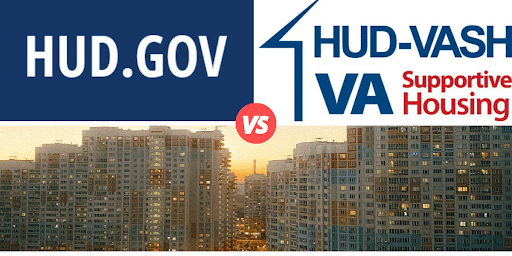As a multifamily real estate investor, you will eventually be faced with deciding whether or not you should acquire/invest in low-income housing properties with housing voucher programs, such as the U.S. Department of Housing and Urban Development’s (HUD) Section 8 program and/or the U.S. Department of Veterans Affairs Supportive Housing (VASH) program. If you ask several owners about their opinion of each program, you’re likely to receive mixed reviews. Frankly, there is a lot of misinformation out there regarding both programs.
Below, we will discuss the pros and cons of multifamily investing with HUD’s Section 8 program and VASH. Hopefully, this information will give you a better idea if either program is right for you.
WHAT IS THE HUD SECTION 8 PROGRAM?
The Housing Choice Voucher Program, more commonly known as the Section 8 Housing program, is the federal government’s main program to assist low-income people, disabled individuals, and the elderly in helping them pay for quality, safe, and decent housing in the private real estate market. To date, HUD’s Section 8 program has provided over 2+ million people affordable housing.
Awardees of a Section 8 program grant can select their own housing without section 8. However, no matter which property they chose, the property/apartment must be approved by the local public housing authority (PHA). Additionally, applicants can choose any section 8 rental. Notably, participants are not restricted to public subsidized housing. Instead, they may select single-family homes, condos, townhomes, duplexes, or traditional apartments.
To qualify for the federal Section 8 program, tenants must make lower than 50% of their area or county’s average income. Once the agency approves the lease agreement, the local housing authority will pay the monthly housing subsidy to the owner directly. The amount of the subsidy varies depending on the applicant’s income and the property’s fair market value as assessed by HUD. It is the tenant’s responsibility to pay for the difference between what is charged by the owner and the rent amount that HUD subsidizes. Keep in mind that families with no income may live completely free using their federal subsidy.
HOW CAN OWNERS BECOME A PART OF SECTION 8?
If you want to become a Section 8 owner, you should apply directly with the local PHA. You will be required to provide basic information about you and your rental.
Once the PHA has reviewed your completed application it will schedule a time to inspect your property. This inspection ensures that your property is compliant with the local building codes, health, and safety codes. The PHA is not looking for, nor does it require your property to be perfect, luxurious, etc. Instead, the agency wants to ensure that the property is “safe,” “decent,” and sanitary.”
If you’ve set your rent too high, the local PHA may require you to lower your rent to be approved into the program. In other words, your rent must meet the fair market rent standards. For example, let’s say you own a two-bedroom condo in Miami-Dade County, Florida. You want to charge $1,700, but HUD’s fair market rent for 2021 is only $1,551 for a two-bedroom in Miami-Dade County. In other words, $1,551 is the maximum allowable rent that can be charged. This means, to become an approved section 8 owner, you must lower your rent to $1,551 or below.
Once you have been approved into the program, you are free to find Section 8 tenants who qualify and meet your personal requirements.
WHAT IS THE VETERANS AFFAIRS SUPPORTIVE HOUSING PROGRAM (VASH)?
The Veterans Affairs Supportive Housing program is a joint program between HUD and VA. The program integrates HUD real estate vouchers with VA supportive services to assist Veterans who are homeless and their households in securing long-term rentals/housing.
Through public real estate authorities, HUD supplies rental help vouchers for independently owned real estate to Veterans qualified for VA health care services and are experiencing homelessness. VA case supervisors may link these Veterans with assistance services such as health care, psychological health treatment, and/or substance abuse therapy to assist them in their healing process and with their ability to keep real estate in the neighborhood.
HOW DOES VASH WORK?
The local PHA office issues the vouchers. However, the local VA Medical Center (VAMC) will manage the entire process. The Veteran receives a case manager who is typically more involved in the process than regular section 8 tenants. The unit will need to go through the same inspection required for Section 8 housing in your county. Finally, keep in mind that the program’s goal is to help Veterans become self-sufficient and ween them off the program so that the voucher can be used for another homeless Veteran.
PROS OF HUD SECTION 8 AND VASH TENANTS
GUARANTEED INCOME
One of the main reasons owners participate in Section 8 or VASH is because of the guaranteed income. Even at the reduced rental rate (sometimes it’s higher than the market rents), it’s still beneficial to have guaranteed income.
HUD AND VA VETS THE TENANTS
One pro is that the local PHA has at least partially vetted potential tenants. Specifically, PHA will run background checks, drug tests and verify income and employment (if any).
CONS OF HUD SECTION 8 AND VASH TENANTS
ANNUAL INSPECTIONS
Section 8 owners must have their rental units inspected annually to ensure that they are up to code. If you fail your annual inspection, you must correct the issues immediately or lose the section 8 subsidy.
CAP ON THE FAIR MARKET RENT AMOUNT
One of the biggest cons to Section 8 is that HUD determines the fair market rent for your designated area. As a Section 8 owner, you cannot charge the tenant above this amount.
COMPLICATED LEGAL PROCESS
Frequently, Section 8 tenancies have additional requirements stated in their lease agreements. As such, Owners must follow these requirements explicitly or risk the court dismissing their cases altogether.
THE PROS USUALLY OUTWEIGH THE CONS
ABOUT THE AUTHOR

Ismael “Rey” Reyes has been actively investing in residential real estate since 2005 and has focused exclusively on multifamily since 2016. He has led MI Real Estate in investing in 13 multifamily properties in Alabama, Florida, Georgia, and Tennessee, totaling 599 units and valued at over $38 million. Rey also provides independent consulting to multifamily investors and is the international bestselling author of

